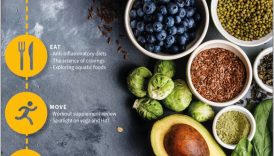Building a Stronger Immune System: Strategies for Health Enthusiasts

Importance of a Strong Immune System
In today’s fast-paced world, maintaining a robust immune system is more crucial than ever. A strong immune system acts as the body’s defense against infections and diseases, helping to ward off everything from the common cold to more severe illnesses. Think of it as your very own security team, constantly on guard to keep harmful invaders at bay. It’s a comforting thought, isn’t it? The importance of bolstering your immune system cannot be overstated, especially considering how it can impact overall health and wellness. When our immune system functions optimally, we feel more energetic and resilient, which enhances our quality of life.
- Building a Stronger Immune System: Strategies for Health Enthusiasts
- Importance of a Strong Immune System
- Overview of Strategies
- Balanced Diet for Immune Health
- Nutrient-Rich Foods
- Hydration and Immunity
- Regular Exercise and Its Impact
- Physical Activity and Immune Response
- Recommended Workouts for Immune Support
- Sufficient Sleep for Immune Function
- Importance of Sleep for Immune System
- Tips for Improving Sleep Quality
- Stress Management Techniques
- Impact of Stress on Immunity
- Relaxation Methods for Immune Support
- Supplements to Boost Immunity
- Vitamin C and Its Benefits
- Probiotics for Gut Health and Immunity
- Immune-Boosting Herbs and Spices
- Turmeric and Its Anti-Inflammatory Properties
- Echinacea for Immune Support
- Lifestyle Habits for a Strong Immune System
- Sun Exposure for Vitamin D
- Importance of Hygiene Practices
- Immune-Enhancing Beverages
- Green Tea for Antioxidants
- Herbal Teas for Immune Support
- Immune-Boosting Activities
- Importance of Social Connections
- Benefits of Mindfulness Practices
Overview of Strategies
Fortunately, there are various effective strategies to boost immune health and ensure that this vital system remains strong. Here are some fundamental approaches:
- Balanced Diet: Incorporating nutrient-rich foods that provide essential vitamins and minerals.
- Regular Exercise: Engaging in physical activities that promote circulation and overall health.
- Sufficient Sleep: Prioritizing rest and recovery to allow the body time to repair and rejuvenate.
- Stress Management: Implementing relaxation techniques to mitigate the negative effects of stress.
- Supplements and Herbal Remedies: Exploring natural options to enhance immune function.
By integrating these strategies into daily life, individuals can build and maintain a strong immune system, paving the way for a healthier future.
Balanced Diet for Immune Health
Nutrient-Rich Foods
Continuing on the path to fortifying your immune system, a balanced diet plays an indispensable role. Think of it as laying a strong foundation for a sturdy building; without it, everything else can come crumbling down. Incorporating a variety of nutrient-rich foods into your meals can significantly impact your immune health. For instance, vibrant fruits and vegetables like oranges, spinach, and berries are packed with vitamins C and A, essential for a fortified immune response. Consider adding these foods to your plate:
- Citrus Fruits: Loaded with vitamin C.
- Leafy Greens: Packed with antioxidants and vitamins.
- Nuts and Seeds: Rich in zinc and omega-3 fatty acids.
- Whole Grains: Provide energy and essential nutrients.
Hydration and Immunity
But it’s not just about the food; hydration is equally crucial! Water helps transport nutrients in the body and ensures that organs function optimally. Proper hydration can support the immune system by flushing out toxins and promoting proper circulation. To stay hydrated:
- Aim for at least 8-10 cups of water daily.
- Include hydrating foods like cucumbers, watermelon, and oranges.
- Try herbal teas as a delicious way to increase fluid intake.
By prioritizing both nutrient-rich foods and adequate hydration, individuals can effectively boost their immune health and overall well-being.
Regular Exercise and Its Impact
Physical Activity and Immune Response
Building on the foundation of a balanced diet, regular exercise is another cornerstone for a robust immune system. Engaging in physical activity isn’t just about shedding calories or toning muscles; it plays a pivotal role in enhancing immune response. When you exercise, your body increases circulation, which promotes the effective transportation of immune cells throughout the body. This can lead to improved defense mechanisms, making it harder for infections to take hold. For instance, I once noticed that after incorporating a regular workout routine into my lifestyle, I felt less fatigued and experienced fewer colds during flu season.
Recommended Workouts for Immune Support
So, what types of workouts should you consider for optimal immune support? A variety of exercises can contribute:
- Aerobic Exercise: Activities like jogging, swimming, or cycling can boost heart health and circulation.
- Strength Training: Lifting weights or doing bodyweight exercises helps build muscle and supports metabolic health.
- Yoga and Stretching: These practices not only enhance flexibility but also help reduce stress, which can be immune-suppressive.
Aim for at least 150 minutes of moderate aerobic exercise each week, and don’t shy away from mixing in some stretching or strength training sessions. By making exercise a regular part of your routine, you’re not just working toward a healthier body; you’re also fortifying your immune system for better resilience against illness.
Sufficient Sleep for Immune Function
Importance of Sleep for Immune System
Having touched upon the significance of regular exercise, we now turn our attention to another fundamental component of immune health: sleep. Just like proper nutrition and physical activity, adequate sleep is vital for the immune system to function effectively. During sleep, the body carries out numerous repairs, including the production of proteins called cytokines, which are essential for combating infections and inflammation. In my own experience, I’ve noticed that when I skimp on sleep, I’m more prone to catching a cold or feeling run-down. It’s fascinating how even a few nights of poor sleep can lead to a noticeable dip in energy and overall health.
Tips for Improving Sleep Quality
To maximize the immune-boosting effects of sleep, consider implementing the following strategies:
- Establish a Routine: Go to bed and wake up at the same time daily.
- Create a Relaxing Environment: Dark, quiet, and cool spaces can enhance sleep quality.
- Limit Screen Time: Reduce screen exposure at least an hour before bed to improve melatonin production.
- Mindfulness Practices: Techniques like meditation or gentle yoga can help calm your mind before bedtime.
By prioritizing sufficient sleep and following these tips, you can significantly enhance your immune function, making it easier for your body to stay resilient against illnesses.
Stress Management Techniques
Impact of Stress on Immunity
Transitioning from the importance of sleep, let’s delve into another critical aspect of maintaining a robust immune system: stress management. It’s no secret that chronic stress can wreak havoc on the body, particularly the immune system. When under pressure, the body releases hormones like cortisol, which, while useful in short bursts, can suppress immune function when elevated for prolonged periods. Personally, I’ve noticed that when I’m stressed out from work or personal matters, I’m more likely to catch a cold or feel fatigued. This connection between stress and immune health underscores the importance of finding effective ways to manage stress in our daily lives.
Relaxation Methods for Immune Support
Fortunately, there are numerous relaxation techniques that can help combat stress and promote a healthier immune response:
- Deep Breathing Exercises: Focusing on breath can quickly calm the nervous system.
- Meditation and Mindfulness: Practices that enhance awareness can reduce stress and improve overall well-being.
- Physical Activity: Engaging in activities like yoga or even walking can release endorphins, which improve mood and reduce anxiety.
- Creative Outlets: Hobbies such as painting, writing, or playing music can provide a therapeutic escape from stressors.
By incorporating these relaxation methods into your routine, you can not only alleviate stress but also strengthen your immune system, helping your body better defend against illness.
Supplements to Boost Immunity
Vitamin C and Its Benefits
As we continue our journey to enhance immune health, let’s explore the potent role of supplements. One well-known immune booster is Vitamin C. Often heralded as the go-to vitamin for warding off colds, Vitamin C is crucial for the growth and repair of tissues and assists in the production of white blood cells, which are essential for fighting infections. Incorporating Vitamin C into your daily routine can be as easy as adding a supplement or simply enjoying a glass of freshly squeezed orange juice. Here are some benefits of Vitamin C:
- Enhances Immune Function: Promotes the activity of immune cells.
- Supports Skin Health: Helps in skin repair and acts as an antioxidant.
- Reduces Severity of Colds: Some studies suggest it can shorten the duration of colds.
Probiotics for Gut Health and Immunity
Another invaluable supplement is probiotics, the friendly bacteria that live in your gut. Did you know that up to 70% of your immune system resides in your gut? This makes gut health vital for a strong immune response. Probiotics can help balance the gut microbiome, enhancing your body’s ability to fight off pathogens. My personal experience with incorporating yogurt and fermented foods into my diet served as a testimony to the benefits of probiotics. Consider these probiotic-rich options:
- Yogurt: A delicious source of live cultures.
- Kefir: A fermented milk drink that offers a concentrated dose of probiotics.
- Sauerkraut and Kimchi: Both are fermented vegetables packed with gut-friendly bacteria.
By integrating Vitamin C and probiotics into your supplement regimen, along with a balanced diet, you can empower your immune system to operate at its best, ready to fend off illness.
Immune-Boosting Herbs and Spices
Turmeric and Its Anti-Inflammatory Properties
After exploring the benefits of supplements, let’s turn our attention to the potent world of herbs and spices that can also enhance immune health. One standout ingredient is turmeric, a vibrant yellow spice commonly found in curry. Turmeric contains curcumin, a compound renowned for its powerful anti-inflammatory properties. When I began incorporating turmeric into my daily meals, often as a golden milk latte, I noticed a reduction in occasional joint pain and an overall better mood during colder months. Here’s how turmeric can support the immune system:
- Reduces Inflammation: Helps lower inflammation markers in the body.
- Supports Immune Function: Enhances the immune response by increasing the production of antibodies.
- Antioxidant Properties: Protects cells from damage caused by free radicals.
Echinacea for Immune Support
Another remarkable herb is Echinacea, often used as a natural remedy to prevent colds and flu. This herb has a long history of traditional use and has been shown to stimulate various immune system components, making it a favorite among herbal enthusiasts. With my experience of taking Echinacea at the first sign of a cold, I often found that my symptoms were milder or even skipped altogether. Here are the key immune-supporting benefits of Echinacea:
- Enhances White Blood Cell Function: Increases the efficiency of immune responses.
- Reduces Cold Symptoms: May decrease the duration of cold and flu symptoms.
- Supports Overall Health: Contributes to a balanced immune system.
By adding turmeric and Echinacea to your culinary and wellness routines, you can harness the power of nature to bolster your immune defense, leading to a healthier, more resilient you.
Lifestyle Habits for a Strong Immune System
Sun Exposure for Vitamin D
Now that we’ve discussed the powerful impact of herbs and spices, it’s time to look at lifestyle habits that can significantly bolster your immune system. One of the most accessible sources of immune support is vitamin D, often referred to as the sunshine vitamin. Sun exposure plays a crucial role in the production of vitamin D, which is vital for immune function. Personally, I always feel energized after spending some time outdoors, and I’ve noticed that regular walks in the sunlight during the day help maintain my mood and keep me feeling well. Here’s how vitamin D can enhance immunity:
- Regulates Immune Response: Helps modulate the immune system to prevent overactive responses.
- Supports Bone Health: Contributes to overall health, which indirectly supports immune function.
- Mood Enhancement: Aids in preventing seasonal affective disorder (SAD), promoting mental well-being.
Importance of Hygiene Practices
In addition to sun exposure, maintaining good hygiene practices is essential for a strong immune system. Good hygiene not only prevents infections but also reduces the overall burden on your immune system. During the height of cold and flu season, I’ve made it a point to wash my hands regularly, and this simple habit has helped me stay healthy. Here are some effective hygiene practices to adopt:
- Regular Handwashing: Use soap and water for at least 20 seconds, especially before eating or after being in public places.
- Sanitization of Surfaces: Regularly clean commonly-touched surfaces like doorknobs, light switches, and phones.
- Avoiding Close Contact: Keep a safe distance from those who are sick to minimize the risk of contagion.
Integrating adequate sun exposure and maintaining good hygiene habits into your daily lifestyle can provide a solid foundation for a resilient immune system, empowering you to combat illness more effectively.
Immune-Enhancing Beverages
Green Tea for Antioxidants
As we continue our journey towards enhancing immunity, let’s explore delicious and health-boosting beverages. One of the most celebrated drinks for immune support is green tea. Packed with antioxidants, particularly catechins, green tea helps detoxify the body and fight off free radicals, which can damage cells and compromise your immune system. I often find solace in my morning cup of green tea; it not only awakens my senses but also sets a positive tone for the day. Here’s how green tea can elevate your immune health:
- Boosts Metabolism: Helps in maintaining a balanced weight, which is essential for overall wellness.
- Supports Immunity: The antioxidants in green tea enhance the body’s ability to fend off illness.
- Promotes Hydration: Staying well-hydrated is crucial for overall immune function.
Herbal Teas for Immune Support
In addition to green tea, herbal teas are another fantastic option for supporting immune health. Each herbal tea offers its unique benefits and flavors. For instance, chamomile tea is known for its calming effects, while ginger tea is celebrated for its anti-inflammatory properties. From my experience, sipping on a warm cup of herbal tea when feeling under the weather provides not only comfort but also immune-boosting benefits. Consider incorporating these herbal teas into your routine:
- Elderberry Tea: Known for its antiviral properties, it can help reduce the duration of colds.
- Peppermint Tea: Aids in digestion and can relieve respiratory issues.
- Ginger Tea: Offers anti-inflammatory benefits and can reduce nausea.
By enjoying these immune-enhancing beverages, you can create a delightful routine that not only hydrates but also nourishes your body, empowering your immune system to thrive.
Immune-Boosting Activities
Importance of Social Connections
Having explored the benefits of immune-enhancing beverages, it’s essential to recognize the significant role that social connections play in boosting our immune systems. Engaging with friends, family, and community can lead to improved mental well-being and lower stress levels, both of which are vital for immune health. Personally, I’ve found that regular catch-ups with friends—whether over coffee or a casual video call—instantly lift my spirits and diminish feelings of isolation. Here’s how social interactions contribute to a stronger immune system:
- Reduces Stress: Positive social interactions can lower cortisol levels, thereby reducing stress.
- Enhances Mood: Strong connections boost emotional health, which is closely tied to immune function.
- Provides Support: Being part of a social network can offer practical help during times of illness or stress.
Benefits of Mindfulness Practices
In conjunction with fostering social connections, incorporating mindfulness practices into your daily routine can also significantly enhance immune health. Mindfulness involves being fully present and aware, which can help reduce stress and improve emotional regulation. During particularly hectic weeks, I’ve noticed that taking just a few moments to practice meditation or deep breathing can completely transform my outlook. Consider these mindfulness practices to bolster your immune system:
- Meditation: Even a short daily session can reduce anxiety and improve focus.
- Deep Breathing Exercises: Taking intentional breaths can quickly calm the mind and body.
- Yoga: Incorporates physical activity with mindfulness, enhancing both physical and mental health.
By cultivating social connections and embracing mindfulness, you can create a robust support system for your immune function, ultimately leading to a happier and healthier life.





